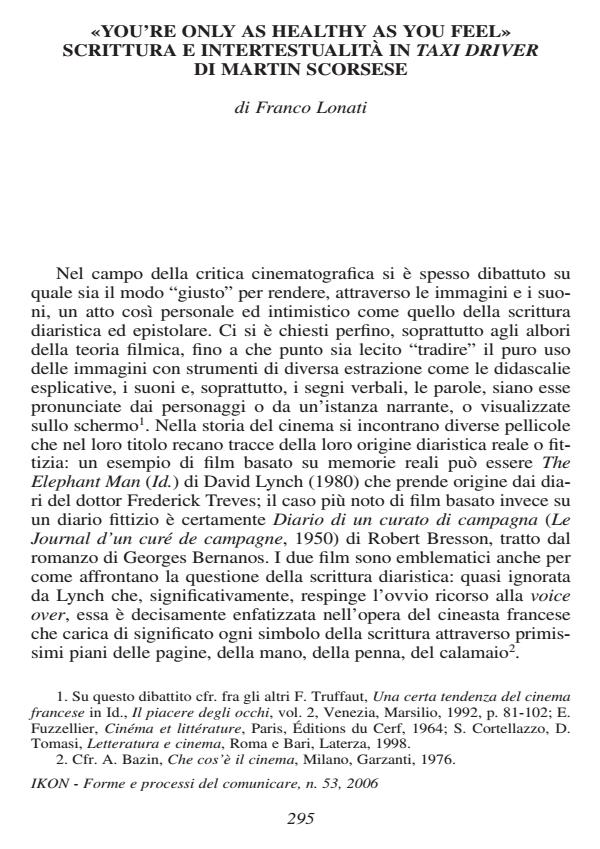"You're only as healthy as you fell". Scrittura e interstestualità in Taxi driver di Martin Scorsese
Titolo Rivista IKON
Autori/Curatori Franco Lonati
Anno di pubblicazione 2009 Fascicolo 2006/53 Lingua Italiano
Numero pagine 27 P. 295-321 Dimensione file 1369 KB
DOI 10.3280/IKR2006-053011
Il DOI è il codice a barre della proprietà intellettuale: per saperne di più
clicca qui
Qui sotto puoi vedere in anteprima la prima pagina di questo articolo.
Se questo articolo ti interessa, lo puoi acquistare (e scaricare in formato pdf) seguendo le facili indicazioni per acquistare il download credit. Acquista Download Credits per scaricare questo Articolo in formato PDF

FrancoAngeli è membro della Publishers International Linking Association, Inc (PILA)associazione indipendente e non profit per facilitare (attraverso i servizi tecnologici implementati da CrossRef.org) l’accesso degli studiosi ai contenuti digitali nelle pubblicazioni professionali e scientifiche
"You're only as healthy as you fell". Scrittura e interstestualità in Taxi driver di Martin Scorsese - The goal of this paper is to analyse the famous Martin Scorsese’s film Taxi Driver (1975) with an interdisciplinary approach and from a double perspective: on the one hand, it examines the narrator’s forms of expression chiefly focusing on the written documents, the journal entries and the autobiographical references in the movie. I also consider the way the director uses these documents in order to trace the twisted psychology of the antihero Travis Bickle, the main character in the movie, played by Robert De Niro; on the other hand, this study investigates the film from an intertextual perspective, centering on how the filmic ‘text’ uses the many other ‘texts’ to which it constantly alludes: literary texts (among the others, Fyodor Dostoevsky’s Notes from Underground and Thomas Wolfe’s God’s Lonely Man), cinematic texts (for instance, Orson Welles’s Citizen Kane and John Ford’s The Searchers), musical texts (songs by Kris Kristofferson and Jackson Browne), or, in some cases, even facts from real life (for example, the attempted assassinations of prominent politicians), not to mention the many autobiographical clues disseminated in the film by screenwriter Paul Schrader, director Martin Scorsese and even by Robert De Niro himself, through his peculiar performance. The result is a compound structured film which makes use of sophisticated narrative and expressive modes. A film not only inspired by its sources but also able, in its turn, to influence the work of other filmmakers and, paradoxically enough, even to affect real life: it’s the case of John Hinckley jr who, obsessioned by Taxi Driver, attempted to assassinate U.S. President Ronald Reagan in an effort to impress actress Jodie Foster, who had played the role of an underage prostitute in the film. All these aspects, together with its unquestionable technical qualities, make Taxi Driver one of the most significant films of a golden age for American filmmaking.;
Franco Lonati, "You're only as healthy as you fell". Scrittura e interstestualità in Taxi driver di Martin Scorsese in "IKON" 53/2006, pp 295-321, DOI: 10.3280/IKR2006-053011